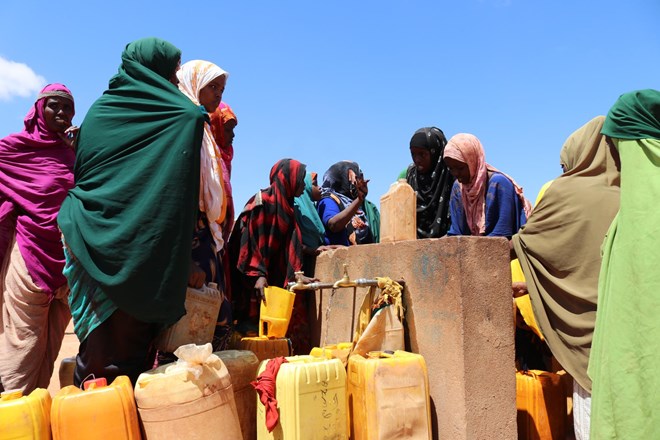
Hassan Istiila
Friday October 6, 2023

UNICEF Somalia/Mumin
Mogadishu (HOL) - An estimated 1.1 million people in Somalia are expected to face a substantial threat due to the impacts of El Niño, agencies warned, amid the regional states of Southwest and Hirshabelle are on high alert as the Shabelle River has already started flooding in the vicinity of the Jowhar and Mahaday districts, while rains have begun in the Southwest state.
A high-level quarterly country humanitarian forum, attended by senior government officials and the country's local and international partners, took place in Baidoa on Wednesday. The forum brings together representatives from the Federal and regional ministries of Humanitarian Affairs, Banadir regional administration, ambassadors, U.N. agencies, national and international NGOs, and delegates from donor organizations, civil society, and the private sector.
The participants called for concerted and coordinated planning to prepare for the anticipated El Niño event, focusing on addressing the pressing needs of the vulnerable population, especially children, women, and people with disabilities. They urged the federal government and the international community to increase funding for humanitarian interventions and anticipatory actions in response to the El Niño event in Somalia.
The forum reaffirmed its commitment to removing obstacles to delivering humanitarian assistance. This includes streamlining imports, simplifying tax exemptions, and reducing bureaucratic requirements at all government levels to enhance humanitarian aid's smooth and timely delivery. Additionally, they underlined a zero-tolerance policy for involving intermediaries to ensure humanitarian assistance reaches its intended beneficiaries.
The forum emphasized the crucial significance of enhancing government agencies' monitoring and evaluation capacity to ensure the effective delivery of humanitarian assistance to its intended beneficiaries.
"The participants strongly call for an expanded role of the government in the planning, implementation, and evaluation of humanitarian aid within the country. We reiterate the imperative need for establishing a unified single biometric registration system for beneficiaries to avoid duplication and overlap in the delivery of humanitarian assistance. We also assert the need to develop laws and regulations criminalizing humanitarian aid misuse and enabling law enforcement agencies to prosecute," the statement reads.
In September, the European Union (E.U.) suspended funding for the World Food Program (WFP) in Somalia following a U.N. investigation that uncovered "widespread theft" and misuse of aid meant to avert famine in the country. Balazs Ujvari, a spokesman for the European Commission, confirmed the temporary suspension.
The U.N. investigation concluded that landowners, local authorities, members of the security forces, and humanitarian workers were all involved in stealing aid intended for vulnerable people.
The U.N. humanitarian aid budget for Somalia is envisaged at 72 million euros ($77 million), of which 10 million euros ($10.68 million) are earmarked for the WFP. The United States is by far Somalia's biggest humanitarian donor. Last year, it contributed more than half of the $2.2 billion of funding that went to the humanitarian response there.
After its worst drought in four decades, Somalia is experiencing one of the world's worst hunger crises, with the U.N. warning that food insecurity is far from over and becoming more severe daily.
According to the U.N., about 4.3 million people in Somalia will face hunger between October and December and require urgent assistance due to El Nino, conflict, and other factors. The UNICEF warned that the impact of the floods is estimated to last for decades without appropriate intervention.